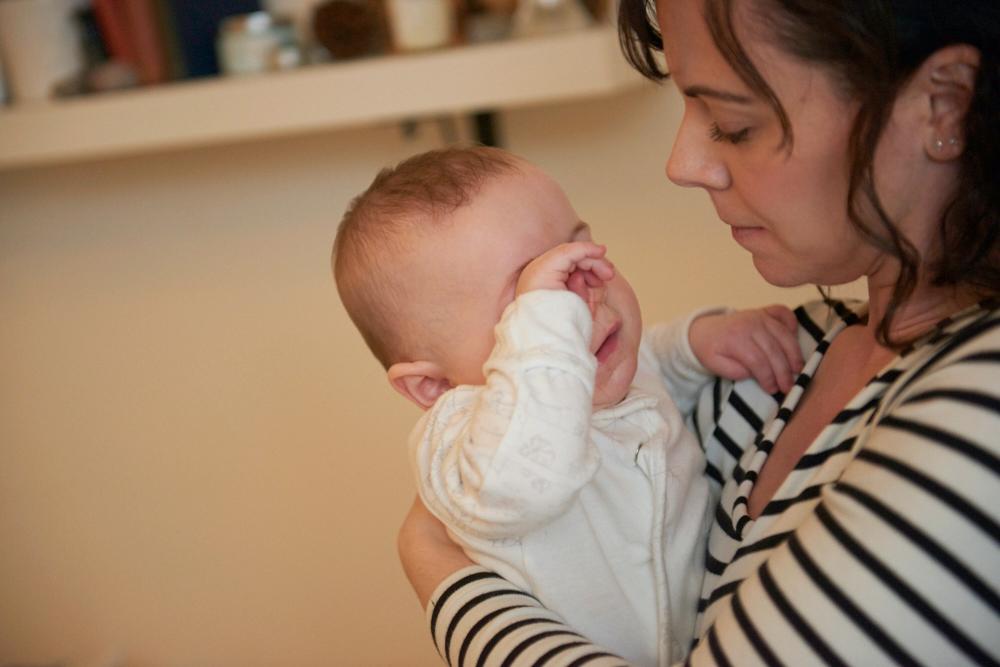Babies usually cry because they’re trying to tell you something – for example “I’m hungry”, “I’m sleepy”, “I want a cuddle!”. On bad days, your baby’s cry might even be: “I’m just crying because I feel like crying!”.
It sounds simple, but when you’re getting to know your baby and everything is so new, it can be anything but. You’d do anything to soothe your little one – if only you knew what was wrong.
We’ve put together our top 10 tips for why your baby may be crying and some tricks you can use to help soothe them. A crying baby is stressful for any parent – so if you’re having a day when it’s driving you to tears, check out parents’ tips for getting through those first few weeks.
Tip#1: Are they hungry?
Tip#1: Are they hungry?
Tip#2: Do they need sleep?
Tip#2: Do they need sleep?
Tip#3: Do they need their nappy changed?
Tip#3: Do they need their nappy changed?
Tip 4: Do they want to be cuddled?
Tip 4: Do they want to be cuddled?
Tip 5: Do they need to be burped?
Tip 5: Do they need to be burped?
Tip 6: Are they too hot or cold?
Tip 6: Are they too hot or cold?
Tip 7: Is there too much going on for them?
Tip 7: Is there too much going on for them?
Tip 9: Does your baby need a change of scene?
Tip 9: Does your baby need a change of scene?
Tip 10: Does your baby feel unwell?
Tip 10: Does your baby feel unwell?
Tip 11: My baby is still crying. What other things might help?
Tip 11: My baby is still crying. What other things might help?
Helping your baby
It's normal for babies to get upset, sometimes very upset! And there will be times when nothing you do seems to help soothe them. As hard as this can be, try not to doubt yourself. This is part of parenting. All you can do is persevere and help your baby become used to you trying to calm them down and understand them.
This is an important part of your baby’s development and is called “rupture and repair”. Over time your baby will get used to the pattern of being upset, you soothing them, and them feeling better. This also helps their brain to grow so they can deal with stress more effectively as they get older.
Take a break
As a parent or carer, hearing your baby cry can get you down too, especially if you’re tired or feeling low. It’s really common to feel helpless and frustrated but if you can’t stand the crying any longer, put the baby somewhere safe, like a cot, or ask someone to help out for a while, and take a break. A cup of tea, a phone call to a friend or a nice shower can give you the strength to carry on.
Never shake a baby. It can cause serious damage to their eyes and brain or even be fatal. If you’re really struggling , put the baby somewhere safe and ask for help from friends, family or the Cry-sis Helpline (08451 228 669).
What the parents say
You pick it up as you go along
"Those first few days, I found myself wondering why anyone had let me leave the hospital with this little baby – I had no idea what I was doing! I would panic when he cried, and was worried I’d forget everything I’d been told at the hospital.
"After a week or so, we started to get into a rhythm where I felt like I knew the signs he was hungry, or it was time to change his nappy. Every day it’s different but now we’re in the swing of things."
Kathy - Edinburgh
Sometimes you both just need a few minutes of time out
“One day, he kept crying and crying. I had done everything I could think of, and nothing helped. I was exhausted, and I just didn’t know what to do.
"I rang mum, she said just to take a wee time out. I felt so guilty, but I was at the end of my tether. I put him down in his cot where I knew he was safe, and told him I’d be back soon.
"I went to the kitchen to splash my face and took a couple of deep breaths. It was only a minute or so, but it made such a difference – when I came back, I felt so much more calm. It was much easier to settle him once I’d had a little break."
Julia – Dalkeith
What the professionals say
If you’re worried about your baby’s crying, ask your health visitor or public health nurse to check them over so you know everything is fine. If nothing is wrong, that’s likely just how your baby is at the moment.
You’re not doing anything wrong, it’s not your fault, and it happens to lots of people. Over time, they’ll become more settled.
Crying is stressful for any parent, and it’s that much harder when you’re exhausted. Talking to new parents and family and friends who’ve been there can really help. You can also find local support groups to meet other parents going through the same thing.



